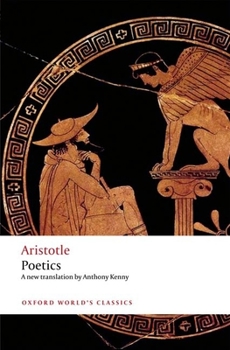Poetics
Select Format
Select Condition 
Book Overview
"What is poetry, how many kinds of it are there, and what are their specific effects?" Aristotle's Poetics is the most influential book on poetry ever written. A founding text of European aesthetics and literary criticism, it has shaped much of our modern understanding of the creation and impact of imaginative writing, including poetry, drama, and fiction. This brief volume brims with Aristotle's timeless insights into such topics as the nature of tragedy and plot-a veritable gold mine for writers and anyone with a serious interest in literature. Moreover, this volume boasts a marvelous new translation by our greatest living historian of philosophy, Anthony Kenny, who also provides an illuminating introduction to this classic work. Kenny sheds light on the philosophical underpinnings of Aristotle's literary criticism and he illuminates the ideas about poetry, drama, and tragedy that have influenced writers and dramatists ever since. Kenny also includes excerpts from key responses to Aristotle, ranging from Sir Philip Sidney's Apology for Poetry and Shelley's Defense of Poetry, to Dorothy L. Sayers' Aristotle on Detective Fiction. The book also features helpful notes, a glossary of key terms, an index, a useful bibliography, and a chronology of Aristotle's life. About the Series: For over 100 years Oxford World's Classics has made available the broadest spectrum of literature from around the globe. Each affordable volume reflects Oxford's commitment to scholarship, providing the most accurate text plus a wealth of other valuable features, including expert introductions by leading authorities, voluminous notes to clarify the text, up-to-date bibliographies for further study, and much more.
Format:Paperback
Language:English
ISBN:0199608369
ISBN13:9780199608362
Release Date:January 2013
Publisher:Oxford University Press
Length:160 Pages
Weight:0.30 lbs.
Dimensions:0.5" x 7.7" x 5.1"
Customer Reviews
5 ratings
Excellent text for intro to theatre course
Published by Thriftbooks.com User , 16 years ago
This translation uses terminology appropriate for teaching the Poetics to beginning theatre students. It is an excellent version for use in a theatre (as opposed to philosophy) class, and the budget price and slim size of the edition make it a fine bargain for students with limited finances. As a theatre teacher of students from middle school to college, I strongly recommend selecting this particular edition and translation of the Poetics for use in discussing the parts of drama in an introductory course.
Aristotle Clearly Explained
Published by Thriftbooks.com User , 17 years ago
By this time, the importance of Aristotle as a philosopher and the first analyst of drama is well known. For budding screenwriters, reading and understand his Poetics is one of the requirements for building good stories. Since I can't read the original in its Attic Greek, good translations are worth their weight in gold. Malcolm Heath's excellent translation is incredible. First, the introduction to the main work is longer than the translation itself. Heath dissects and explains EVERYTHING so that when reading the main work, things are clear. Not satisfied with that, there are notes to the translation as well! One comes away from this work with a crystal clear understanding of the concepts Aristotle teaches. This definitely is my preferred translation of the Poetics. 10 stars!
Poignant Insights
Published by Thriftbooks.com User , 20 years ago
The ancient observer's insights have stood the test of time. Some elements of human nature remain consistent regardless of the century or technology. Aristotle thought classification was important. In this work he sets forth a taxonomy for poetics. One of the more controversial statements he makes in this book is "poetry is both more philosophical and more serious than history." He doesn't leave it at that, being the philosopher he is he goes on to explain himsself. He adds, "poetry speaks more of what is universally the case, whereas history speaks of particular events." This book will give you a comparison that spans cultures and centuries.
Where art theory began
Published by Thriftbooks.com User , 22 years ago
This book (or perhaps just a portion of Aristotle's lecture notes) remains the acorn of an oak of subjects, from art criticism to playwriting to poetry. This is a clear, accurate translation (it helped me pass a test in Ancient Greek; and people who really know assure me). The text is no-frills and the introduction is brief but informative. This is probably not for scholars who will want to quibble over the meaning of 'phusis' and 'techne' but for the general reader who will be infinitely enriched by a philospical masterwork. Unlike other such masterworks, this one is short and readable!
A Classical masterpiece!
Published by Thriftbooks.com User , 23 years ago
Aristotle's Poetics is hailed as the first systematic critical theory in the world. For centuries and centuries, it has inspired writers, critics, and philosophers alike. Aristotle, the father of critics, as many would exalt him, sets the rules for many key literary genres such as Tragedy, Comedy, and Epic. Through comparing and contrasting these classical genres, Aristotle convincingly argues for the highness and greatness of tragedy, as the most mimetic literary genre. Thanks to Aristotle, we are introduced to such eternally important critical terms such as mimesis(imitation), muthos(plot), anagnorisis(discovery), peripeteia(reversal),hamartia(misjudgment), catharsis(purgation). In other words, Aristotle's Poetics is the bible for critics, playwrights, and fans of tragic literature.






